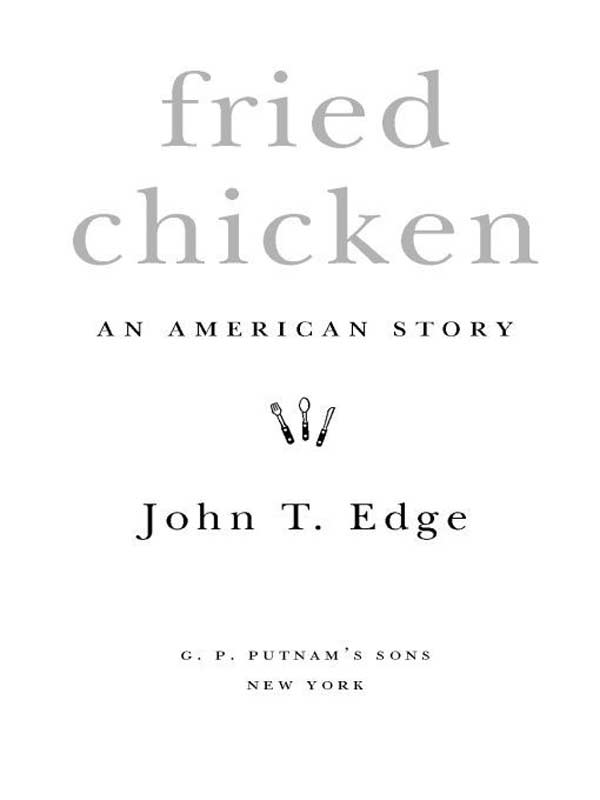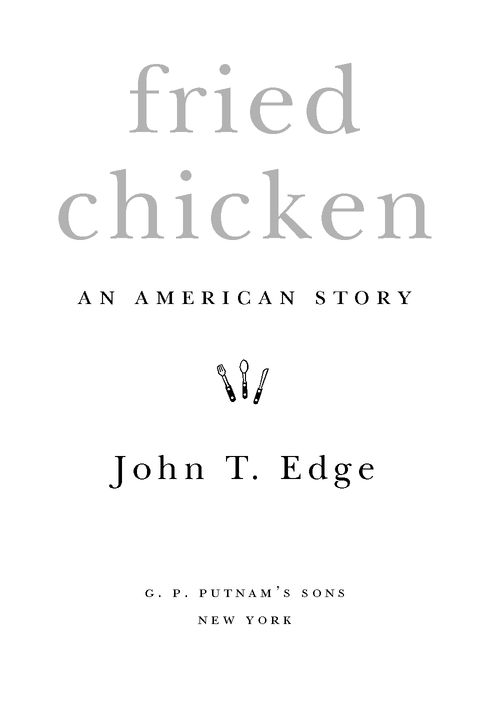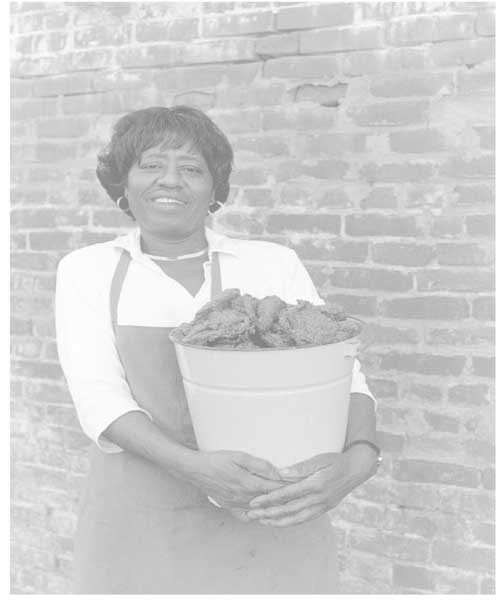Fried Chicken
Authors: John T. Edge


Table of Contents

The recipes contained in this book are to be followed exactly as written. The Publisher is not responsible for specific health or allergy needs that may require medical supervision. The Publisher is not responsible for any adverse reactions to the recipes contained in this book.

G. P. Putnam's Sons
Publishers Since 1838
a member of
Penguin Group (USA) Inc.
375 Hudson Street
New York, NY 10014
Publishers Since 1838
a member of
Penguin Group (USA) Inc.
375 Hudson Street
New York, NY 10014
Â
Copyright © 2004 by John T. EdgeAll rights reserved. No part of this book may be reproduced, scanned,
or distributed in any printed or electronic form without
permission. Please do not participate in or encourage
piracy of copyrighted materials in violation of the
author's rights. Purchase only authorized editions.
Published simultaneously in Canada
or distributed in any printed or electronic form without
permission. Please do not participate in or encourage
piracy of copyrighted materials in violation of the
author's rights. Purchase only authorized editions.
Published simultaneously in Canada
Â
Photographs of Mattie Smith, Greenwood, Mississippi (p. viii),
and of Jesse Clifton Evans Edge (p. 182) © Amy Evans
Lyrics to “Fried Chicken and a Country Tune” (p. 65) by C. Harwell
and of Jesse Clifton Evans Edge (p. 182) © Amy Evans
Lyrics to “Fried Chicken and a Country Tune” (p. 65) by C. Harwell
Â
Library of Congress Cataloging-in-Publication Data
Edge, John T., date.
Fried chicken : an American story / John T. Edge.
p. cm.
Edge, John T., date.
Fried chicken : an American story / John T. Edge.
p. cm.
ISBN :978-1-4406-2756-9
FOR MY SON, JESSE CLIFTON EVANS EDGE. MAY YOU NEVER KNOW A MCNUGGET.
it is possible that anyone claiming to be considered an educated gentleman may be thought to have done a bold thing in publishing a book on poultry, and giving his real name on the title page.
Â
Treatise on the History and Management of Ornamental and Domestic Poultry(1849)
âREVEREND EDMUND SAUL DIXON

Introduction
This is the first in a series of books that celebrates America's iconic foods. Fried chicken leads off, then in quick succession come apple pie, donuts, hamburgers & french fries. To my mind, these are democratic foods that conjure our collective childhood and call to mind the question once posed by a Chinese philosopher: “What is patriotism, but nostalgia for the foods of our youth?”
I chose these foods because they transcend inter-regional variation and internecine debate over origins. Recognized from the Atlantic to the Pacific as uniquely American, they evoke the culinary and cultural fabric of our nation.
Though the places profiled and the recipes detailed can be read as keys to eating well here in the States, my intent was not to compile a list of the country's top spots. Instead, please consider this work to be my pilgrimage in search of America's greasy grail. In this book and the ones that follow, I strive to introduce you to people and foods that, by virtue of their myriad ethnicities, by dint of their unvarnished honesty, comprise a tapestry of America.
ONE

Wherein I Argue for a New Theory of Fried Chicken
Â
Â
Â
Â
Â
fried chicken is best served without a side of provincial bluster. I trace that realization to an encounter with Jim Villas's 1982 book,
American Taste.
The North Carolinian observed, “Let's not beat around the bush for one second. To know about fried chicken, you have to have been weaned and reared on it in the South. Period.”
American Taste.
The North Carolinian observed, “Let's not beat around the bush for one second. To know about fried chicken, you have to have been weaned and reared on it in the South. Period.”
As a fellow weaned and reared Southerner, I initially embraced Villas's pronouncement. But more recently, while spending a year on the road in search of America by way of fried chicken, I've learned that Villas was wrong. Eating my way across the girth of our nation, I found much evidence to support the notion that, though the South has a long and distinguished history of fried chicken cookery, we have no lock on excellence.
No palate can deny the appeal of the bread-crumb-coated chicken backs I gnawed in Barberton, Ohio; or the mojo-marinated breasts I devoured in Miami; or the cornmeal-crusted drumsticks I savored in Seattle. The notion that Southerners have an exclusive on fried chicken is attributable to an enduring phenomenon, the blind ascription to Southern distinctiveness. You know the routine: Summers are muggier, girls are prettier, dogs are lazier way down south in Dixie. A while back, I read an essay wherein an academic argues that the South is not necessarily richer in history or tradition or memories, but that owing to its peculiar past, the region plows more of its intellectual energy into telling tales that are at best playfully boastful, at worst, self-aggrandizing. Tales like, “To know about fried chicken, you have to have been weaned and reared on it in the South. Period.”
I'm not one to abjure my native victuals. I own three cast-iron skillets. Each, by way of repeated use, is burnished black as Satan's bung. I am adept at rendering lard, and I dote on the cracklings that sink to the bottom. I've yet to eat my fill of chicken fried in the Southern manner; I can hold forth with the best of my kinsmen as to proper preparation and consumption.
But bad comes with good. As a Southerner, I also find it difficult to wash my palate clear of the bitter taint of racism. Herein, I pay homage to the region's legendary fry cooks of African descent. To do so is to document the sad injustices of a Jim Crow South where blacks worked in white homes and businesses, wringing chicken necks and hefting skillets to stovetops, but were denied a place at the lunch counter, the dining room table.
I tell some Southern stories in the pages that follow. But education is funny. Expose a boy to the wide world, and soon he develops a heretical idea or two. As in, “Fried chicken is not distinctly Southern; maybe it's not even distinctly American.” Or, better yet, “If fried chicken is American, then it denotes an American identity that accommodates cooks from a plethora of traditions.”
Â
Â
Â
a case in point: Many of the cooks I've met lately have been recent immigrants who, intent upon assimilation, fry chicken in a conscious attempt to cook an iconically American dish. And yet, a glimmer of home oftentimes shines through. The effect is not diverting so much as it is mosaic-making. Legions of Korean entrepreneurs fit this pattern, including the interrelated Baltimore purveyorsâat Lexington Fried Chicken, Park's Fried Chicken, and Super Fried Chickenâwho, in addition to fried breasts and wings and drumsticks, sell fried chicken necks and fried rice.
Other entrepreneurs further complicate the equation. At New Caporal in New York City, Dominican fry cooks serve Cuban-inflected orange-garlic-and-lime-marinated chicken to a mostly African American clientele. Thirty blocks away at El Mundo, their countrymen dole out vinegar-marinated chicken to a mostly Dominican crowd that, for the most part, forsakes the chicken in favor of a smashed plantain and pork dish known as mofongo.
Â
Â
Â
spend a year eating fried chicken, inhaling fried chicken fumes day and night, and just at the point when you're about to go bonkers, everything comes into focus. Somewhere along the way, maybe while munching a three-buck bag of
chicharrones de pollo
from El Mundo, I experienced such an epiphany. I had always known that, to understand chicken as fried in these United States, I would have to deal with more than the Southern question; I would have to contend with the matter of mystique. And in order to be well equipped to do so, I spent an inordinate amount of time collecting fried chicken lore.
chicharrones de pollo
from El Mundo, I experienced such an epiphany. I had always known that, to understand chicken as fried in these United States, I would have to deal with more than the Southern question; I would have to contend with the matter of mystique. And in order to be well equipped to do so, I spent an inordinate amount of time collecting fried chicken lore.
I knew the basics: that the Depression-era Republican Party slogan “A chicken in every pot” was derivative of a pledge made by King Henri IV of France, who in the sixteenth century pronounced, “I hope to make France so prosperous that every peasant will have a chicken in his pot on Sundays.” And I knew that such statements packed wallops because, until the latter half of the twentieth century, chickens were expensive. That's expensive as in costing more than beef, more than veal.
I knew that the relatively sudden transition from luxury to commodity animated our conflicted love affair with fried chicken, that the transition could explain our tendency to sentimentalize the dish, to cloak it in family and home, though devotees are not above digging into an eight-piece box from Popeye's. Therein I gleaned a defining paradox: Fried chicken is at once a totem of tradition and a lowest-common-denominator lunch.
Â
Â
Â
What's more, fried chicken is the stuff of song, as inOther books
Touched by Death by Mayer, Dale
Prisoner's Base by Rex Stout
Surrender of Trust (First Volume of the Surrender Series) by Mariel Grey
Long Time Lost by Chris Ewan
Unconditional surrender by Evelyn Waugh
A Little Change of Face by Lauren Baratz-Logsted
Hard Case Crime: Fifty to One by Ardai, Charles
Stolen by Melissa de la Cruz
The Drazen World: The California Limited (Kindle Worlds Novella) by Catherine C. Heywood
Star Force: Penance (SF49) by Jyr, Aer-ki
